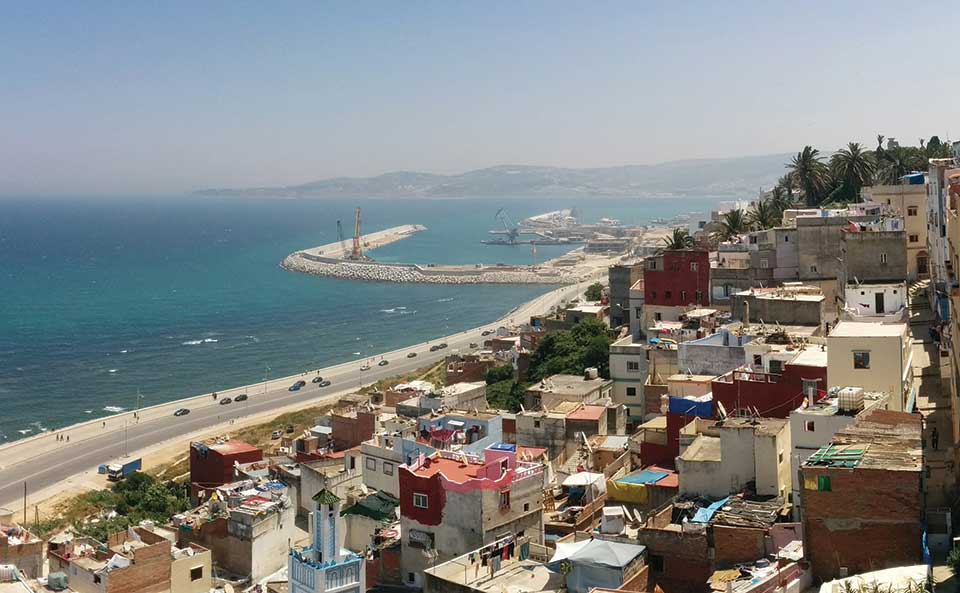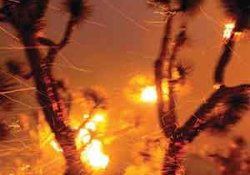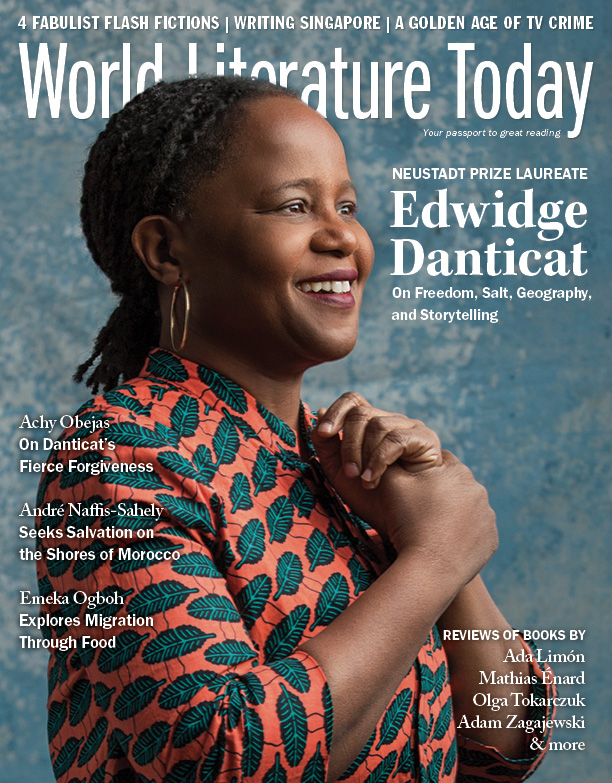You’ll Never Leave: Seeking Salvation on the Shores of Morocco

Throughout its 2,500-year history, irrespective of whether it was a Carthaginian colony, a Roman provincial capital, a Portuguese colony, an English naval outpost, or a Moroccan fishing port, Tangiers has always considered itself a transit nexus. Yet some arrive, never to leave.
If the past decade has taught us anything, it is that Fortress Europe begins along the Maghrebi coast. Reacting to scaremongers inciting public panic over a largely imaginary sub-Saharan “invasion” of white Europe, frightened EU governments since the mid-2010s have increasingly opted to divert a small trickle of money to the countries of Morocco, Algeria, and Libya in order to keep the tens of thousands who attempt to reach Europe away from their intended goal, essentially turning the southern Mediterranean coast into the EU’s first line of defense. Unfortunately, as several human-rights groups have pointed out, the money is often siphoned away by corruption or is simply misspent, financing police raids on migrant camps instead of providing adequate shelter to desperate people.
Long before the so-called migration crisis became a semipermanent fixture of news headlines, a writer-artist team from the Ivory Coast and Cameroon produced one of the most engaging and thoughtful accounts of the travails faced by young West African men on their sojourns to the European mainland, the nonfiction graphic novel Une éternité à Tanger, or An Eternity in Tangiers, which was illustrated by the Ivorian Faustin Titi and written by the Cameroonian Eyoum Nganguè. Their protagonist, Gawa, is a young man who hails from the fictional town of Gnasville, a town on the Atlantic coast of Africa, which Nganguè intended to act as a stand-in for most sub-Saharan cities. Although Gawa is a diligent student and applies himself, he cannot get ahead. The authorities are incorrigibly venal, and one’s ability to get ahead in life is entirely reliant on one’s connections.

Putting his fate into the hands of a shady businessman, Gawa persuades his extended family to loan him money for the big trip north to Europe, and he leaves in the back of a truck. After numerous betrayals, illegal crossings, and near-death experiences, he crosses the desert and finds his way to Morocco. Instead of taking the final step to Europe, which becomes a goal that recedes further and further from his reach, Gawa has no option but to stay since he cannot return home empty-handed, given how hugely his family has invested in his prospects.
I FIRST CAME ACROSS An Eternity in Tangiers in late 2012, eight years after it was originally published by a small specialist press in Italy. It was early December and I had taken the train north from Fez, where I had been living for the past year. I was headed to Tangiers, hoping to catch a ferry early the next morning to Tarifa in Spain, so as to renew my three-month visa. After a six-hour trip, the train pulled into Tanger-Ville station just after 1 am, and the street outside, save for a single beat-up turquoise taxi, was completely deserted. The latest Darija pop single bellowed out of the car’s stereo, while the driver inside had fallen asleep, his head resting against the wheel.
I had shared the journey with Abbas, an old Berber man who had gone to visit his sister in Fez for a few weeks and was now going to stay with his thirtysomething son in Tangiers. Once we had stepped outside the station, Abbas drew my attention to the cordon of half-finished ten-story skyscrapers surrounding us. “Drug money,” he told me, nudging my elbow and ejaculating a snicker, adding that the construction boom the city had witnessed over the last decade had been largely fueled by profits earned from smuggling drugs and people over to Europe. As it turned out, the station behind us, a bland glass-and-steel affair with faux Islamic motifs, was situated smack in the middle of an active construction site. It was to be a new neighborhood, Tangiers City Center, the ancient city’s sleek new claim to modernity: glitzy shopping malls hardly any locals could afford as well as a convention center and two Hilton hotels for visiting businessmen and tourists.
Abbas, who was in his seventies, was old enough to remember the public ecstasy surrounding King Mohammed V’s return from exile in 1955. He remembered how hopeful his family had been for the country’s prospects. Nevertheless, while the Spanish and French colonizers were finally gone, life for the Berbers under their Moroccan replacements grew considerably worse. Only a year following independence, Mohammed V’s son and future heir, Crown Prince Hassan, led a battalion of French mercenaries into the Rif—the mountainous Berber cultural region curling up toward Spain in the northern part of Morocco—to crush a brewing rebellion there. Two of Abbas’s uncles died in that conflict, which ended when Prince Hassan finally carpet-bombed those farming villages into submission.
It was only the beginning of one of the Rif’s darkest chapters. When the crown prince assumed the throne in 1962 as Hassan II, he began a forty-year policy of diverting government attention and investment away from Tangiers and the Berbers of the Rif. There were few schools, and fewer jobs; in addition, what little infrastructure existed was barely suited to the nineteenth century, let alone the twenty-first. As a result, Abbas had lived through the mass exodus of the 1960s and early 1970s, when the Rif’s villages had emptied out as countless young Berbers went to work in Europe’s factories and mines, as well as the bread riots of the 1980s. “Then the king died,” Abbas said, lighting a cigarette, “but by then I was too old!”
Indeed, once the kingship passed to Hassan’s son, Mohammed VI, in 1999, it appeared as though Tangiers’s fortunes were bound to improve. Fond of the times he had spent at his grandmother’s seaside palace in Morocco’s only major city on the Mediterranean, the young king wasted no time in reversing his father’s discriminatory policies against the Berbers and began lavishing time and attention on the long-neglected city. He encouraged European corporations to set up shop in the free industrial zones on the outskirts and drove the expansion of the port of Tanger-Med, which, when completed, will be the Mediterranean’s busiest port. Not a bad list of accomplishments for a man Time magazine once labeled “The King of Cool.”
Mohammed VI has also overseen a Putinization of Morocco, where power remains absolute and business deals are concluded solely with the approval of the king’s cabal of crony capitalists.
However, almost none of the wealth created by these new policies has actually trickled down to ordinary Riffians and Tanjawis. In fact, despite his pristine international image as a business-friendly reformer, Mohammed VI has also overseen a Putinization of Morocco, where power remains absolute and business deals are concluded solely with the approval of the king’s cabal of crony capitalists. His Majetski—as he is sometimes called—has also turned himself into the country’s single biggest landowner. Luckily for him, his reign has also benefited from the “myth of Moroccan exceptionalism” in a region that has almost entirely gone up in flames. After all, since the popular uprisings of 2011, Morocco remains an enviable island of tranquility, and little seems to threaten the monarchy’s hold on power for the moment.
Meanwhile, the population of Tangiers, having quadrupled since 1980, has reached a million, as people continually leave the depressed surrounding countryside to settle in the city’s shantytowns, where the workers employed in the free zones struggle to pay their rent. Unsurprisingly, Abbas told me that most of the people who left the mountains hardly ever found enough work to support themselves. Most wound up living off of relatives or picking up odd bits of work where they could. Abbas’s son worked for a Spanish construction company whose owner had relocated to Tangiers after the recession forced him to close his business in Spain. He made a decent wage, a rare prospect in a county where one out of three young men is unemployed. “Et puis, il y a les noirs!”* he added, meaning the ever-growing crowds of African migrants swelling the city’s population. After bumming one last cigarette, Abbas finally decided to wake up the taxi driver, and they sped off down the Avenue d’Espagne.
One of the country’s leading liberal publications, the weekly TelQuel, had recently published an exposé on whether Moroccans, being the citizens of an African country, actually felt African. The answer was a flat, resounding no.
I headed toward the sea, only a few hundred feet to the north, and took a left on Avenue Mohammed VI, walking alongside the half-moon of dirty beach until I reached the port. There, young black men sat in groups of four or five, scattered across the cement plazas overlooking the sea. They kept to themselves, taking sips from communal flasks or bottles while looking out across the water. I had often seen men like them referred to in the Moroccan press as “le péril noir” (the black peril). One of the country’s leading liberal publications, the weekly TelQuel, had recently published an exposé on whether Moroccans, being the citizens of an African country, actually felt African. The answer was a flat, resounding no. To the popular Moroccan mind-set, Africa is a land of misery, disease, and instability. The lighter-skinned Arabized Moroccan elite, headed by Mohammed VI’s Alaouite dynasty, rules over a country that never wanted to be limited to its African cradle. Sometime during his bloody reign, Hassan II famously proclaimed that Morocco was a tree whose roots were firmly anchored in Africa but whose branches extended outward, toward Europe.
These days, it would be more accurate to say that those branches bend to the petrocracies of the Persian Gulf, which have made significant investments in the country, buying up real estate and funding mosques and religious institutions. In brief, regardless of where those branches are headed, it is anywhere but Africa. Thus, the men, women, and children who share Gawa’s situation find themselves undesirable aliens in a country that also happens to refute its African heritage.
I WAS TIRED and ached to sleep. The earliest ferry to Tarifa was still more than five or six hours away, so I headed to the casbah above the promontory. There was a single police car on the road leading up to the Bab al-Bahr, the casbah’s seaside gate. It was so late at night that I wasn’t surprised when a policeman flashed his light in my eyes and asked to see my documents. He quickly let me go. I rented the “deluxe suite” at a boarding house in the casbah, not far from the gate. It was a coffin-sized broom closet with a rusty air-conditioning unit that protruded haphazardly out of the wall, just inches above where I was supposed to lay my head. The unit rattled violently all night, sticking out of the wall like a dog’s thirsty tongue. It was past two in the morning by then, but the pension was a hive of activity. Men with towels around their waists walked the halls, while others sat and quietly played cards or stared at their phones.
A few random conversations revealed the same story: how to live in the limbolike gap between anticipation and actualization, how to not go crazy with anger at the fact that salvation was almost palpable and yet still so far out of reach.
A few random conversations revealed the same story: how to live in the limbolike gap between anticipation and actualization, how to not go crazy with anger at the fact that salvation was almost palpable and yet still so far out of reach. I heard Wolof and French as well as at least another couple of languages I hadn’t heard before, but almost no Arabic or Darija. Everyone here was from a kind of Gnasville, whether it was Mali, Chad, Niger, Eritrea, Liberia, Sierra Leone, Senegal, or the Gambia. Like Gawa, many of them had attempted to secure visas in their respective countries before seeking illegal alternatives. As Gawa reminisces in An Eternity in Tangiers, “Before attempting to leave Africa by land, we had tried the various legal recourses available to us. . . . We visited all the consulates of quite a few European countries. All to reach the end of a line where a bureaucrat hands you back your passport where they’ve stamped: Visa denied.”
Those lines acquired a deeper meaning once one considered the inspiration behind Eyoum Nganguè’s script for An Eternity in Tangiers, which was unfortunately deeply rooted in his own life. Once one of Cameroon’s finest journalists, he had built a career on exposing political corruption, chiefly for Le Messager Popoli. Nganguè was sentenced to a year in prison in 1996 for insulting Paul Biya, Cameroon’s president, as well as disseminating “fake news,” namely pointing out cases of political corruption. Although he was released shortly afterward on parole, Nganguè decided to apply for asylum in France once his editor was incarcerated following Biya’s reelection, which wasn’t entirely an unforeseen sequence of events given that Biya has been in power since 1982. Of course, Nganguè was one of the lucky ones, being granted exile in France in 1998, where he co-founded the Journalistes Africains en Exil association, connecting writers and activists forced to flee their native countries due to their work.
LATER THAT MORNING, a few hours after the sun had risen, I joined the crowds streaming past the Bab al-Bahr’s rocky horseshoe and left the casbah to head toward the docks. The smaller groups I had seen on my arrival had doubled or tripled in size. Some would occasionally try to sneak through the lines of ticketed customers heading toward their ferries. Their difficulties were not mine. My own ticket was barely checked. The ferry was almost empty, save for a few men drunkenly idling around the few slot machines scattered around its cavernous interior. I left the stale air behind and went to stand at the stern. Tangiers grew smaller and smaller in the distance. Throughout its 2,500-year history, irrespective of whether it was a Carthaginian colony, a Roman provincial capital, a Portuguese colony, an English naval outpost, or a Moroccan fishing port, Tangiers has always considered itself a transit nexus. Yet owing to the pressures caused by the new migration, as well as His Majesty’s self-serving policies, it struck me that Tangiers had become a prison of impermanence for many, if not most, of the people who live there, whether Berber or sub-Saharan.
Over the measly twenty minutes it took for me to cross that tiny strait of water using my European passport, I watched the ferry’s creamy wake and pondered Gawa’s parting words: “Our natural resources are free to go to Europe, no questions asked, but when it comes to our children, then they ask to see their papers! Or they end up spending an eternity in Tangiers without ever knowing if they would one day go home, or die with Fortress Europe still in sight.”
Los Angeles












